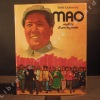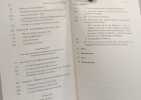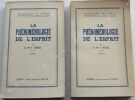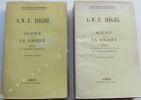-
Type
Book (4049)
Magazine (549)
Old papers (2)
Photographs (1)
Posters (8)
-
Latest
Last 24h (21)
Last 3 days (2)
Last month (53)
Last week (9)
-
Language
Dutch (1)
English (2)
French (4603)
Italian (1)
Portuguese (1)
Spanish (1)
-
Century
16th (3)
17th (2)
18th (6)
19th (113)
20th (2615)
21st (154)
-
Countries
Belgium (330)
Brazil (1)
Canada (6)
Côte d'Ivoire (3)
France (4049)
Italy (21)
Netherlands (6)
Switzerland (193)
-
Syndicate
ALAC (6)
CLAM (2)
CLAQ (1)
ILAB (1692)
NVVA (80)
SLACES (74)
SLAM (1605)
SNCAO (2)
Le marxisme de Marx à Mao - Théorie et pratique de la révolution
Chronique Sociale de France , L'Essentiel Malicorne sur Sarthe, 72, Pays de la Loire, France 1968 Book condition, Etat : Bon broché, sous couverture imprimée éditeur marron petit In-4 1 vol. - 312 pages
1ere édition Contents, Chapitres : Préface de Jean Lacroix - 1. Le jeune Marx, 1818-1844 : Un jeune bourgeois idéaliste - A la recherche d'une philosophie, l'héritage de Hegel, 1835-1841 - Entre le libéralisme et la révolution, 1841-1843 - La critique de l'Etat et de la politique, première théorie de la révolution prolétarienne - Le communisme humaniste des Manuscrits de 1844 - 2. La théorie matérialiste de l'histoire, de 1844 au Manifeste communiste, 1848 : La polémique contre la Sainte-Famille - La rupture avec le matérialisme de Feuerbach, les Thèses sur Feuerbach, printemps 1845 - La première formulation du matérialisme historique, l'idéologie allemande, septembre 1845 - mai 1846 - La rupture avec le communisme chrétien, la circulaire contre Kriege - La rupture avec Proudhon, Misère de la philosophie - Le Manifeste communiste - 3. Révolution théorique et pratique révolutionnaire : La théorie marxiste de la connaissance, le marxisme est-il une métaphysique ou une théorie scientifique ?- L'objet de la science, l'étude d'une totalité, le mode de production capitaliste - Idéologie et connaissance scientifique, la théorie marxiste des idéologies - Marxisme et religion, le dialogue chrétiens - marxistes - Science et révolution, Marx et le mouvement ouvrier - Index, indications bibliographiques dos et bords des plats de la couverture insolés, pliures aux coins du plat inférieur, infime petit manque de papier au coin de la premiere page, le papier est un peu jauni, annotations assez nombreuses (principalement des passages soulignés ou entourés en vert et rouge), cela reste un bon exemplaire de lecture complet
Le marxisme - Théorie et pratique de la révolution
Chronique Sociale de France , L'Essentiel Malicorne sur Sarthe, 72, Pays de la Loire, France 1972 Book condition, Etat : Bon broché, sous couverture imprimée éditeur petit In-4 1 vol. - 303 pages
3eme édition Contents, Chapitres : Préface de Jean Lacroix - 1. Le jeune Marx, 1818-1844 : Un jeune bourgeois idéaliste - A la recherche d'une philosophie, l'héritage de Hegel, 1835-1841 - Entre le libéralisme et la révolution, 1841-1843 - La critique de l'Etat et de la politique, première théorie de la révolution prolétarienne - Le communisme humaniste des Manuscrits de 1844 - 2. La théorie matérialiste de l'histoire, de 1844 au Manifeste communiste, 1848 : La polémique contre la Sainte-Famille - La rupture avec le matérialisme de Feuerbach, les Thèses sur Feuerbach, printemps 1845 - La première formulation du matérialisme historique, l'idéologie allemande, septembre 1845 - mai 1846 - La rupture avec le communisme chrétien, la circulaire contre Kriege - La rupture avec Proudhon, Misère de la philosophie - Le Manifeste communiste - 3. Révolution théorique et pratique révolutionnaire : La théorie marxiste de la connaissance, le marxisme est-il une métaphysique ou une théorie scientifique ?- L'objet de la science, l'étude d'une totalité, le mode de production capitaliste - Idéologie et connaissance scientifique, la théorie marxiste des idéologies - Marxisme et religion, le dialogue chrétiens - marxistes - Science et révolution, Marx et le mouvement ouvrier - Index, indications bibliographiques signature de l'ancien propriétaire sur la page de titres, sinon bon état, papier à peine jauni
Mao. Réalités d'une légende.
1976 Editions Robert Laffont / L'Express - 1976 - Fort in-4, cartonnage rouge avec dorure sur le 1er plat et le dos, sous jaquette illustrée en couleurs de l'éditeur - 336 p. - Très nombreuses reproductions potographiques in, hors-texte et pleine page en couleurs et en N&B
Bon état - Dos de la jaquette insolé - Extrémités du dos de la jaquette émoussées
La fin des Soviets.
Paris, Malfère, 1937. In-12, v-188 pp., broché.
« Pacifiste, il (Henri Guilbeaux) était membre du Comité d’honneur de la Ligue internationale des Combattants de la Paix (LICP) ; il démissionna du Comité, en désaccord avec le plan de désarmement unilatéral défendu par Sébastien Faure (…) il étudia les structures et l’idéologie de la Russie soviétique, de l’Allemagne national-socialiste et de l’Italie mussolinienne, montrant les filiations et les ressemblances entre ces diverses expériences. » (Dictionnaire Le Maitron). (H2)
La Fin des Soviets.
Paris, Société française d'éditions littéraires et techniques, Edgar Malfère, 1937 1 volume In-8° (12 x 18,5cm) Broché. 1 feuillet, 185p. (dont V d'avant-propos paginées en chiffres romains), 2 feuillets. Bon état (très petite fente de charnière).
Edition originale (mention imprimée au dos) du dernier ouvrage de l'écrivain et journaliste militant Henri GUILBEAUX (1884-1938), qui fut anarchiste et pacifiste puis communiste, correspondant officiel de la Pravda dès mai 1917: condamné à mort en France pour "haute trahison" en 1919, il part en U.R.S.S.; acquitté, il rentre en France en 1937 et sera parmi les premiers à dénoncer la dérive stalinienne de l'U.R.S.S., mais pour se livrer alors à des éloges de Mussolini: ici pamphlet antisoviétique où l'antifascisme de l'époque est qualifié d' "attrape-nigauds" (p. 130) et Victor Serge d' "imposteur". Exemplaire avec plusieurs mentions manuscrites de "Henri de Valois en Arles".
La révolution de Fidel Castro.
Couverture rigide. Reliure toile de l'éditeur. 285 pages.
Livre. Texte de présentation de Jean Farran. Club des amis du livre, 1962.
"Guilhem Fabre Hector Mandarès Gracchus Wang Ed. Redon Katia Nguyen et Xi Xuanwu"
Reference : 19351
(1974)
"Révo. cul. dans la Chine pop. Anthologie de la presse des Gardes rouges (mai 1966-janvier 1968)"
"1974. Paris Union Générale d'Editions Bibliothèque Asiatique 1974 e.o. - Broché 10 cm x 18 cm 448 pages 1 carte hors-texte - Sous la direction de Guilhem Fabre anthologie préparée par Hector Mandarès Gracchus Wang Ed. Redon Katia Nguyen et Xi Xuanwu notices biographiques - Bon état"
Le luxembourgisme aujourd hui: Rosa Luxembourg et les Conseils ouvriers
Spartacus, 2ème série, n° 32, Mars 1970, 60 pp., broché, couverture un peu empoussiérée, état satisfaisant.
Phone number : 0033 (0)1 42 23 30 39
La Chine populaire.
Couverture souple. Broché. 128 pages. Légèrement défraîchi. Cachet de bibliothèque.
Livre. Editions P.U.F (Collection : Que sais-je? N° 840), 1977.
Vivre à Pékin.
P., Plon, 1978, in 8° broché, 238pp. ; illustrations hors-texte ; couverture illustrée.
PHOTOS sur DEMANDE. ...................... Photos sur demande ..........................


Phone number : 04 77 32 63 69
Le Vertige. Chronique des temps du culte de la personnalité. Traduit du russe par Bernard Abbots avec le concours de Jean-Jacques Marie.
P., Le Seuil, 1967, in 8° broché, 424 pages ; couverture illustrée.
PHOTOS sur DEMANDE. ...................... Photos sur demande ..........................


Phone number : 04 77 32 63 69
MEMOIRES DE SIMON 1941-1945. Marseille, Nice, Lyon, Paris, chronique de la Résistance et de l'Occupation par le responsable interrégional du Front National Zone Sud.
L'Auteur 1990. In-8 broché couverture illustrée 375pp 2 feuillets non chiffrés. Avec quelques illustrations. Envoi de l'auteur. Exemplaire frais et bien complet.
Le Front National de Lutte pour la Libération et l'Indépendance de la France dont il est question ici, était une organisation de résistance communiste. (3658)
Bolsjewisme: geschiedenis en leer.
, 's Hertogenbosch, 1932, Teulings., Geillustr. cover, 304pp., 23x15cm., zeer goede staat.
Nederlandsche bewerking van H.J.A. Van Son
Der Bolschewismus - Einführung in Geschichte und Lehre
, Freiburg im Breisgau, Herder 1931, xi + 340pp., linen cover, stamps, used
Our sights to the future
New Century Publishers | Paris 1960 | 13.50 x 19.50 cm | agrafé
Edition originale. Agréable exemplaire. - Photographies et détails sur www.Edition-Originale.com -


Phone number : 01 56 08 08 85
Balades dans la culture
Editions Sociales, 1978. Format 14x21 cm, broche, 202 pages. Avec un gros choc sur un coin du livre.Etat acceptable.
La tyrannie socialiste. [Relié à la suite : ] Les principes de 89 et le socialisme.
Paris Delagrave 1893-1894 1 vol. relié 2 ouvrages reliés en 1 vol. in-12, demi-chagrin rouge, dos à nerfs orné de fleurons dorés, XV + 272 + XXII + 281 pp. Réunion en édition originale de ces deux titres du journaliste, économiste et homme politique Yves Guyot (1843-1928). Bon exemplaire, bien relié au milieu du XXe siècle.
François Eudes de Mézeray : Histoire et pouvoir en France au XVIIe siècle
Editions H & D 2011 444 pages 14x3 6x20 4cm. 2011. Broché. 444 pages.
Bon état tranche ternie intérieur propre bonne tenue
COMMUNISME et FRANC-MACONNERIE
Un ouvrage de 182 pages, format 145 x 190 mm, broché, publié en 1961, Les Presses Continentales, bon état
Phone number : 04 74 33 45 19
"Guérilla, N° 1, octobre 1968; revue du comité anti-impérialiste Che Guevara."
Liège, Lucien Perpette, Editeur, 1968. 15 x 22, 34 pp., broché (agrafé), bon état.
LA PHÉNOMÉNOLOGIE DE L'ESPRIT 2 vol.
Paris Aubier - Éditions montaigne 1947 2 8° Broché 358 & 357 Aubier, Éditions Montaigne, Paris, 1947. Deux volumes in 8° brochés de 358 et 357 pages, soulignures dans le premier volume mais bon état général. Poids avant emballage 850 gr, frais d'envoi colissimo 8
Soulignures dans le premier volume Remises possibles sur les achats en lot, achetez plusieurs objets à la fois ! Reçoit sur rendez-vous pour consultation des ouvrages.
SCIENCE DE LA LOGIQUE Tome 1 : La logique objective ; tome 2 : La logique objective (fin) suivie de La logique subjective.
Paris Aubier - Éditions montaigne 1947 & 1949 2 12° Broché 445 & 581 pp Aubier -Montaigne, Paris, 1947 & 1949, deux volumes in 12° brochés de 445 & 581 pages. Les deux volumes n'ont pas été imprimés ensembles, ce qui explique la différence de teinte des couvertures. Poids avant emballage 750 gr, frais d'envoi colissimo 8
Quelques passages soulignés dans le premier volume, bon état général Remises possibles sur les achats en lot, achetez plusieurs objets à la fois ! Reçoit sur rendez-vous pour consultation des ouvrages.
Images de Lénine.
Couverture souple. Reliure de l'éditeur. 370 pages.
Livre. Traduit du hongrois par Georges Aranyossy. Livre club Diderot, 1970.
Rapport du comité exécutif au 2e Congrès de l'Internationale communiste
Feltrinelli Reprint In-8 Couverture souple Milan 1967
Très bon 59 pages. Ex libris manuscrit masqué. Édition facsimilée de l'ouvrage paru à Petrograd en 1920.
 Write to the booksellers
Write to the booksellers




![La tyrannie socialiste. [Relié à la suite : ] Les principes de 89 et le socialisme.. GUYOT (Yves).](https://static.livre-rare-book.com/pictures/VIG/116022_1_thumb.jpg)









